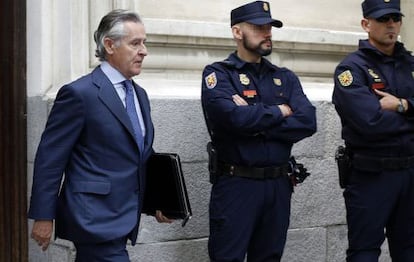Caja Madrid bank chiefs racked up €15.5m on undeclared company cards
Executives and board members say they were convinced what they were doing was legal

Board members and top-level executives at bailed-out Spanish banks Bankia and Caja Madrid racked up personal expenses totaling €15.5 million over 10 years using undeclared company credit cards.
Between 2003 and 2012 the cards were given to 86 recipients outside of normal expense accounts and were used to pay for, among other things, clothes, meals, supermarket goods and trips, according to a court investigation being overseen by investigating High Court Judge Fernando Andreu. They were also used to make €2.1 million in ATM cash withdrawals.
The cards were used to pay for, among other things, clothes, meals, supermarket goods and trips
Among the names who used the cards were former Caja Madrid president Miguel Blesa; his successor at Bankia – the banking giant formed in 2010 by merging Caja Madrid and six other savings banks – Rodrigo Rato, as well as board members appointed by the Popular Party, Socialist Party, United Left and the CCOO labor union. Rato, who received a salary of €2.8 million from Bankia in 2010, and a number of other executives have already given back the money they spent on the cards.
On Thursday Madrid regional premier Ignacio González dismissed economy director general Pablo Abejas for allegedly clocking up expenses worth €246,700 on his card. The regional government has also called on the Caja Madrid Foundation to dismiss its president, Carmen Cafranga, for spending €175,000 using her card.
Madrid economy director general Pablo Abejas has been dismissed for allegedly spending €246,700 on his card
A number of those who figure on the list have expressed their surprise at the Anticorruption Attorney’s Office investigation, saying they are convinced that what they were doing was legal. But they also failed to explain how they declared the personal expenses they ran up at Caja Madrid.
Their theory of legality clashes with the fact that Rato and others have paid back what they spent, but they say their case is different. “The executives had company credit cards, but we didn’t. It was our only way of paying for expenses relating to our activities as board members,” they said.
Some said they never used the cards to withdraw cash, while others claimed they never even knew their pin numbers. All admit that they were used to pay for travel, food, books and other expenses “relating to their activities.” Some also say that the purchase of suits was among the items included.
It couldn’t have been hidden because I saw all the expenses on the Caja Madrid webpage” Caja Madrid board member
“It couldn’t have been hidden from the tax man because I saw all the expenses on the Caja Madrid webpage, like with any other card,” said one board member who asked to remain anonymous. “I didn’t have anything to hide. I had a spending limit and I knew I couldn’t exceed it.”
The cards came to light after Bankia on June 26 sent the head of the Orderly Bank Restructuring Fund (FROB) – the public entity responsible for managing the merger and refloating of Spain’s struggling saving banks and Bankia’s main shareholder – two internal audit reports alerting of the handing over of cards “outside the ordinary circuit” and the existence of millions in outlays it could not account for. Caja Madrid was responsible for the large part of the expenses – €15.25 million – with Bankia executives running up goods and services to the value of €245,200.
The FROB passed these on to the Anticorruption Attorney’s Office, which on September 2 opened an investigation, the results of which were sent to Judge Andreu. He has now included these in his summary of the Bankia case, which is investigating irregularities in the management of Caja Madrid and Bankia that led to the latter receiving a €4.465-billion bailout from the Spanish government via the FROB in March 2011.
Having identified possible evidence of corporate crimes and wrongful appropriation, Andreu has now sent all the documentation relating to the cards to two experts at the Bank of Spain to analyze if any of the people who used them committed any crimes.
Tu suscripción se está usando en otro dispositivo
¿Quieres añadir otro usuario a tu suscripción?
Si continúas leyendo en este dispositivo, no se podrá leer en el otro.
FlechaTu suscripción se está usando en otro dispositivo y solo puedes acceder a EL PAÍS desde un dispositivo a la vez.
Si quieres compartir tu cuenta, cambia tu suscripción a la modalidad Premium, así podrás añadir otro usuario. Cada uno accederá con su propia cuenta de email, lo que os permitirá personalizar vuestra experiencia en EL PAÍS.
En el caso de no saber quién está usando tu cuenta, te recomendamos cambiar tu contraseña aquí.
Si decides continuar compartiendo tu cuenta, este mensaje se mostrará en tu dispositivo y en el de la otra persona que está usando tu cuenta de forma indefinida, afectando a tu experiencia de lectura. Puedes consultar aquí los términos y condiciones de la suscripción digital.








































